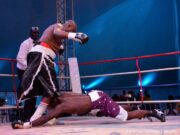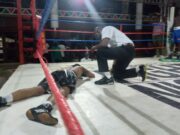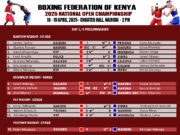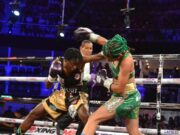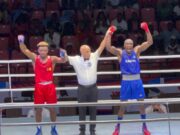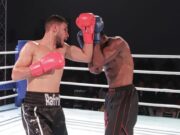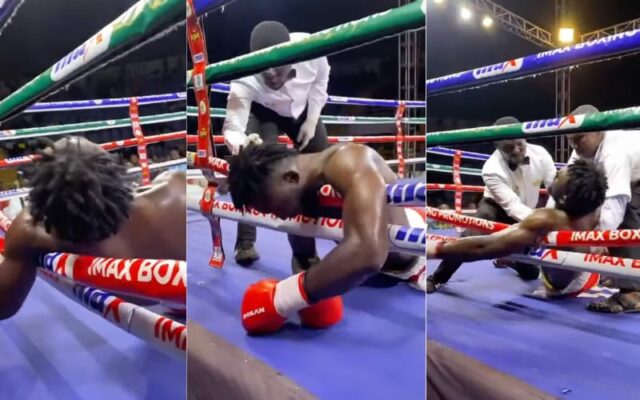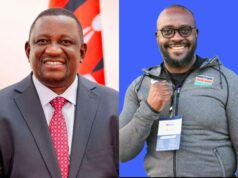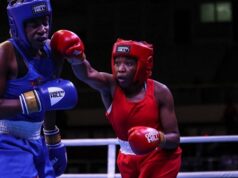REGULAR BRAIN SCANS IN AFRICA PRO BOXING SHOULD NOW BE MADE COMPULSORY TO AVOID MORE DEATHS IN THE RING
▪️ It’s high time African governments are fully involved in regulating pro boxing to assist promoters and commissions in the exorbitant brain scans
The death of Ghana’s Ernest “Bahubali” Akushey should serve as a wake-up call for African governments to avoid sitting on the fence and get fully involved in regulating professional boxing.
Akushey, 32, died two weeks after fighting compatriot Jacob Dickson at the Bukom Boxing Arena in Accra.
In a typical reactionary measure common in Africa but a wise decision, Ghana’s National Sports Authority has suspended boxing in what it said was a necessary step to protect lives, uphold the integrity of the sport and ensure its future as as well as establishing more professional and globally-aligned standards for boxing.
The Ghanaian authorities did however not specify whether the suspension affects only pro boxing or amateur boxing is also involved.
What now needs to be by the African governments is to be fully involved in regulating pro boxing and make it mandatory for all pro boxers to undergo regular brain scans to detect injuries that lead to death if timely appropriate measurers are not taken.
In the developed world pro boxers normally undergo regular brain scans, and those with serious injuries especially blood clots are politely ordered to quit boxing to save their lives.
This however does not happen in Africa because brain scans are expensive not to mention the commissions and promoters care less on the wellbeing of the pro boxers.
Needless to say some African pro boxers may appear normal in every sense of the word but if properly diagnosed they suffer from undetected injuries owing to lack of of brain scans.
That’s why the African governments need to step in and assist the promoters and commissions in financing the brains scans or use their own neuro-surgeons if at all they care for the health of their pro boxers.
The check-ups should also be extended to amateur boxers especially retired top international boxers who can as well be covered medically by their respective governments taking into account the effects of head punches affect them mostly after they step out of the ring. Several of them are probably suffering in silence with nobody to assist them or detect any abnormality in their behaviour.
Brain scans like MRIs are recommended or sometimes required for professional boxers, including those in Africa, to establish a baseline for detecting brain changes over time, identify potential risks like cerebral aneurysms, and rule out acute traumatic brain injuries (TBIs) after a fight.
While studies on African boxers specifically were not found, the general principles of combat sports neuroimaging apply, emphasizing the value of baseline scans to monitor for long-term effects of head trauma.
Purpose of Brain Scans, Establish a Baseline:
A scan before the first professional match provides a “snapshot” of the brain to monitor for changes over time.
Identify Pre-existing Lesions:
Scans can detect abnormalities such as aneurysms or tumors that could increase the risk of serious injury during a fight.
Monitor for Chronic TBI:
The baseline scan helps track the development of brain changes associated with chronic traumatic brain injury over a boxer’s career.
Post-fight scans can assess for acute TBIs or other immediate brain injuries.
Recommendations
Professional Boxing Consensus:
Organizations like the Association of Ringside Physicians (ARP) recommend a baseline MRI for all professional combat athletes to help with individualized risk stratification and care.
Mandatory Licensing:
Some boxing commissions require annual MRI scans as part of licensing procedures.
These guidelines are applicable globally, but in Africa’s pro boxing scene such important procedures are ignored not to mention the exorbitant cost involved in bran scans..
Why it matters for African Boxers
While this response cannot provide statistics on African boxers’ brain scans specifically, the general understanding of combat sports neuroimaging suggests that these tools are valuable regardless of a boxer’s geographic location.
The principles of monitoring for chronic TBI and identifying pre-existing conditions through baseline scans are crucial for the health and safety of all professional fighters, including those in Africa.





